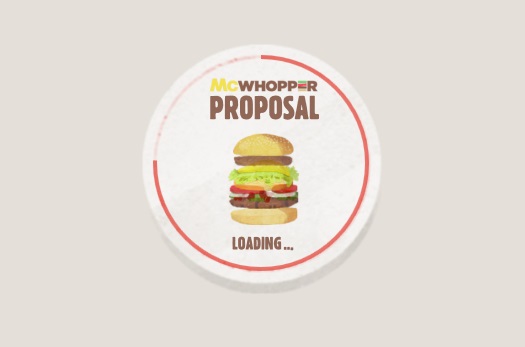In honor of the International Day of Peace (since 1981) or Peace One Day (now), Burger King reached out to its rival in the Burger Wars, McDonald’s, with a friendly suggestion. On September 21st, Burger King said, the two companies should get together, create a pop-up store midway between their respective corporate offices and serve McWhoppers for free to peaceniks who would pledge to “settle a beef” with someone.
Burger King created a nice McWhopper website with plenty of animations, video, and CTAs. They offered a possible blueprint for the McWhopper and some design concepts for the packaging. It was a clever idea, a fun execution, and Burger King put it in print ads as well as online, so McDonald’s couldn’t miss it.
McDonald’s could have joined in and shared in the good feelings and free publicity, but instead they chose to send a snarky response. Why, they sneered, would they want to do something as small and petty as a free burger with a feel-good message, when they “could do something bigger”?
As of this writing, McDonald’s has not yet come up with a suggestion for the “meaningful global effort” they have in mind.
But they did go on to chastise Burger King for not being serious enough about the pain and suffering of war, and to say that “a simple phone call” would have been better than Burger King’s nicely designed publicity stunt.
Burger King is looking into an alternative sandwich. Coke is providing a theme song. Peace One Day will go on without McDonald’s. But McDonald’s is being lambasted for their ungracious behavior all over the web.
Lessons learned
This isn’t McDonald’s first social media screw-up. Remember #McDStories? We had a list of lessons to be learned from that episode, and here’s a list of lessons to learn from this one:
- Don’t be a jerk on social media. McDonald’s posted their little “nyah nyah nyah” publicly on Facebook, where thousands of visitors have taken the opportunity to tell them what jerks they are. Maybe “a simple phone call” would have been better than their ill-considered post.
- Respond when there’s a problem. McDonald’s responded with an apology to someone who complained about rudeness among Brazilian counter staff, but is ignoring the comments on their response to Burger King. Often, a thoughtful response at the beginning can turn this kind of situation around.
- Start with a strategy. It’s pretty clear that the McDonald’s response did not begin with a calm discussion about what kind of effect the corporation wanted to achieve. If they had, they might have noticed that they’d be dissing the U.N.’s International Day of Peace and alienating consumers, neither of which was on their to-do list for the day.



Leave a Reply